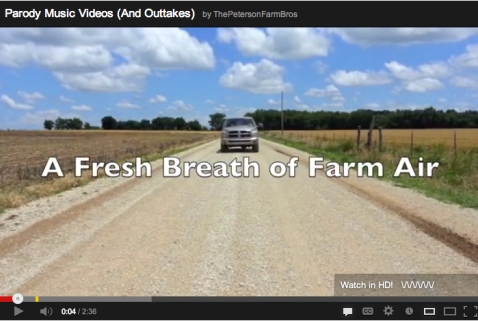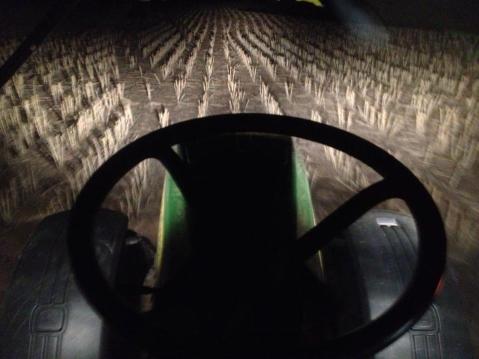Finally, some rain
Good afternoon!
We’ve been blessed with several rain showers in recent weeks at Servi-Tech’s headquarters in Dodge City, Kan.

Last night, the heavens opened and dropped almost 3.5 inches in the Dodge City area. (Photo courtesy Servi-Tech’s Director of Operations Pete Kruse)
The National Weather Service in Dodge City said on its Facebook page that Dodge City’s precipitation is .29″ above normal for the year. The weather service has measured more than 15 inches of rain this year in Dodge; we’ve received 6.78 inches of rain in August alone.
This is a big deal to people who live in southwest Kansas (and Nebraska, Colorado, and other states) because of the drought that has lasted for years. The U.S. Drought Monitor has much of western Kansas listed in exceptional drought (it’s updated every Thursday, so this information is from last week).
We’re thankful for whatever moisture we get – although it’s kind of weird to see photos of flash flooding in western Kansas.
Here are some links to weather stories in our region:
From The Garden City Telegram (Kansas): Recent rainfall across state shatters records, could ease drought (Aug. 12, 2013)
From Kearneyhub.com (Nebraska): Rain, hail impacts Broken Bow (Aug. 12, 2013)
From The Grand Island Independent (Nebraska): Rain helps crops, but cool weather slowing development (Aug. 12, 2013)
From The Garden City Telegram (Kansas): Cleanup in progress after Wednesday torrent (Aug. 2, 2013)
Kansas cuts 25th billionth bushel of wheat
Good morning!
Here’s a great story from The Hutchinson News (in Hutchinson, Kan):
The 25th billionth bushel of wheat in a century of Kansas wheat production was harvested earlier this month.
Farmer Mike Brown ceremoniously caught grain in a bushel basket on his farm near Colby to mark the achievement, as his son Tanner unloaded the combine into a grain cart.
Kansas Wheat reported the 25th billionth bushel cut last week. According to the association, 25 billion bushels equals more than 1 trillion commercial loaves of bread.
While an amazing feat, it’s not surprising considering Kansas’ rich history as the nation’s breadbasket, producing nearly one-fifth of all the wheat grown in the United States.
Read the rest here.
3i Show
Good afternoon!
We wanted to let everyone know that we’re at the 3i Show in Dodge City, Kan. this week.
If you’re around, stop by the Servi-Tech booth, which is booth 160 inside. Come get rain gauges, calculators, and key chains! We also have TheProfiler set up, and we’re ready to answer any questions about it.
We’re also ready to talk about our purpose, which is making the planet more productive (MP2). Come see us if you want to know more!
Corn at Sunrise
Good morning!
We hope everyone had a wonderful Fourth of July.
Here’s some video that Bryan Boroughs, one of our agronomists at Servi-Tech, took of a corn field near Montezuma, Kan.
Farm Parody Videos
Good morning!
The Peterson Farm Brothers have released another agriculture parody video. The latest one is called A Fresh Breath of Farm Air (Fresh Prince Parody).
You can find that video here.
Here are their other videos:
- I’m Farming and I Grow It: http://www.youtube.com/watch?v=48H7zOQrX3U
- Farmer Style: http://www.youtube.com/watch?v=LX153eYcVrY
Waterlogged?
Good afternoon!
Parts of the Midwest are experiencing heavy rains and waterlogged fields.
Here’s a story from Ag Professional about how the crops fair in heavy rains.
Corn and soybean survival in waterlogged soils
Over the last five days, some areas in South Dakota, Iowa and other states have received more than 6 inches of rainfall leading to ponded or flooded areas in fields. Water saturated or waterlogged soils lack enough oxygen for root respiration and many wonder, “How long can corn and soybeans plants at early growth stages survive in these waterlogged soils?” There are many factors that lead to this question’s answer says Nathan Mueller, South Dakota State University Extension Agronomist.
“We know that the crop growth stage, variety/hybrid, duration of ponding/saturation, soil type, soil/air temperature, and other factors can affect the survival of corn and soybean plants under these waterlogged conditions,” Mueller said. “Unfortunately other factors reduce plant population related to flooding including crusting, plants covered in sediment or buried under residue, and increase in seed/seedling diseases like damping-off in soybean.”
Currently, the crop growth stages of most corn and soybean range from germination to V3 and germination to V1, respectively. At these early growth stages of germination, emergence and early vegetative, Mueller says both corn and soybean plants are negatively impacted quite quickly by waterlogged conditions.
“Crops that are not completely submerged have some limited capacity for diffusion of oxygen to occur from the shoot to the root, which increase survival time,” he said. “Oxygen is needed by plant cells for growth and development including germination.”
Read the rest of the story here, or at http://tinyurl.com/knopsfp.
In the News: Canola
Good morning!
Here’s a cool story from The Garden City (Kansas) Telegram: Kearny County farmer takes a chance with canola
Along the River Road between Deerfield and Lakin, families and farmers have stopped along the south side of the road to inspect a field of vibrant yellow blooms.
Fred Ritsema, a Kearny County farmer and owner of Lakin Dairy, said his canola field has been in bloom since last week.
Fred Ritsema stands in his canola field near Lakin. Ritsema planted canola for the first time this year. (Photo by Becky Malewitz/Telegram )
Ritsema, who is from Holland, used to grow the crop there and decided to try his luck with the Kansas soil.
Since canola is a winter crop, Ritsema thinks more farmers may be interested in growing it.
Ritsema has farmed in Kearny County since 1997. Growing corn and alfalfa has been difficult in recent years due to the drought.
“This has gotten a lot of farmers’ attention. I think in the near future more farmers will be turning to winter crops instead of summer crops,” he said.
Read more: http://www.gctelegram.com/news/canola-field-5-14-13#2#ixzz2TwF5GVMY
This Week in Photos
Servi-Tech in the News
Servi-Tech has been in the news recently!
Here’s a link to a news article from the Dodge City (Kan.) Daily Globe, in which Bryan Boroughs, a technical support agronomist, talked about frost damage done to wheat in the area.
And here’s the latest column in The Wichita Eagle from Mark Vierthaler, Servi-Tech’s director of communications.












Learning Ag First Hand
Dr. Julie McClure, a science policy associate at the Soil Science Society of America, spent two days in April taking an agricultural tour of the High Plains with Fred Vocasek, a senior lab agronomist at Servi-Tech.
Here’s a video of Dr. McClure talking about her experience.
An article about the trip can be found here, or by going to http://tinyurl.com/p3zujna.